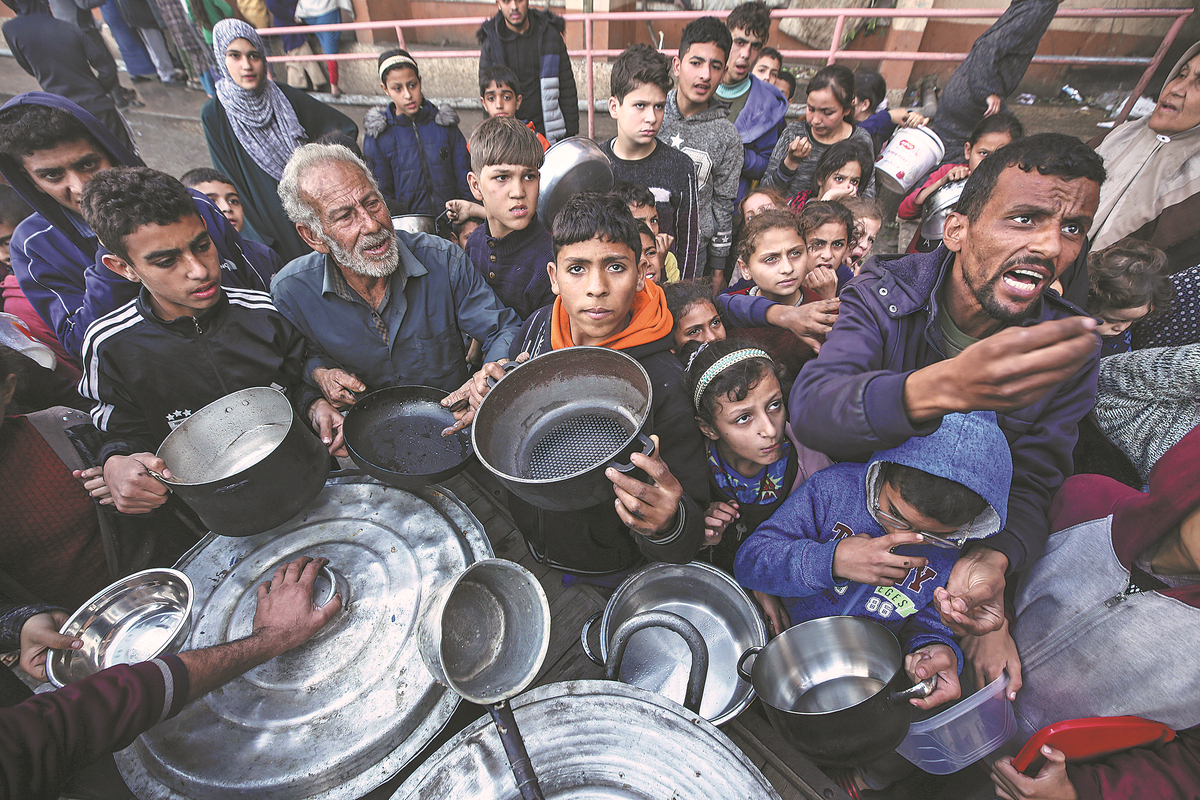Famine looms over Gaza amid conflict
Analysts see truce efforts in dire need as starvation takes a toll on civilians
By JAN YUMUL in Hong Kong | China Daily | Updated: 2024-02-27 08:18

Reports of a possible temporary cease-fire deal in the Israel-Palestine conflict have been welcomed by analysts as they noted that starvation is taking a toll on civilian lives amid an ongoing food crisis in Gaza.
Philippe Lazzarini, commissioner-general of the United Nations Relief and Works Agency for Palestine Refugees in the Near East, lamented that the last time the organization was able to deliver food aid to northern Gaza was on Jan 23, adding that their calls to send food aid "have been denied and have fallen on deaf ears".
Doha-based news outlet Al Jazeera reported on Sunday that a 2-month-old Palestinian boy died from starvation in northern Gaza, just days after international child welfare advocates warned of an "explosion" in child deaths due to Israel's attacks on the besieged enclave.
On Feb 19, UNICEF, the World Health Organization, and the World Food Programme issued a consolidated statement, noting that before the ongoing hostilities, malnutrition was rare in Gaza with just 0.8 percent of children under 5 classified as acutely malnourished.
Acute malnutrition now affecting 15.6 percent of children under 2 in northern Gaza suggests "a serious and rapid decline".
"The deliberate starvation, particularly evident in the northern part of Gaza, is viewed as a coercive tactic aimed at compelling Palestinian resistance factions to acquiesce to Israeli terms," Belal Alakhras, a political analyst and Palestinian researcher at the University of Malaya in Malaysia, told China Daily.
"Amid this critical juncture in Gaza with far-reaching regional implications, the role of international actors comes under scrutiny, serving as a litmus test of whether the global landscape remains predominantly under the sway of US unipolarity or has indeed transitioned to a multipolar reality," he added.
Negotiations on hammering out an urgent cease-fire deal took place in Paris among representatives from Egypt, Qatar, the United States, and Israel on Friday.
Conditions on a potential six-week pause involve a prisoner swap deal between Hamas and Israeli authorities, various media outlets reported.
The talks were set to resume in Qatar where an Israeli delegation was expected to arrive to continue securing a pause in the conflict in Gaza that may see its hostages being released.
Israeli Prime Minister Benjamin Netanyahu told US broadcaster CBS News it was unclear whether a hostage deal would materialize from the negotiations but said Hamas needed to make more reasonable demands as he accused them of being on "another planet".
Mediation visit
Meanwhile, Qatar's Emir Sheikh Tamim bin Hamad Al Thani, whose country has been involved in mediation efforts, is scheduled to visit Paris for his first state visit to France since becoming emir in 2013. Gaza is expected to be the dominant subject of his talks with French President Emmanuel Macron.
Alakhras from the University of Malaya noted that almost five months into the conflict, Israel had yet to achieve its stated military objectives.
This dilemma, he said, "has not gone unnoticed by Israel's allies", who are now exploring alternative approaches to safeguard Israeli interests "amid this quagmire".
"Discussions of a potential pause or cease-fire in Gaza reflect a maneuver to secure the release of Israeli prisoners in exchange for Palestinian detainees, affording Israel the opportunity to reassess its approach to the situation," said Alakhras.
"In contrast, Palestinians are seeking a cessation of hostilities to stop the ongoing bloodshed, which is mostly felt by civilians.
"Israel and its allies, particularly the United States, appear inclined to perpetuate this cycle, seeking to evade the implications of the October moment, which also poses a threat to the political standing of the current Israeli government and regional leverage for them," he said.
Meanwhile, Palestinian Prime Minister Mohammed Shtayyeh said on Monday his government is resigning.
President Mahmoud Abbas must decide whether he accepts Shtayyeh and his government's resignation.
"The next stage and its challenges require new governmental and political arrangements that take into account the new reality in the Gaza Strip," Shtayyeh said at a cabinet meeting.
Agencies contributed to this story.
























